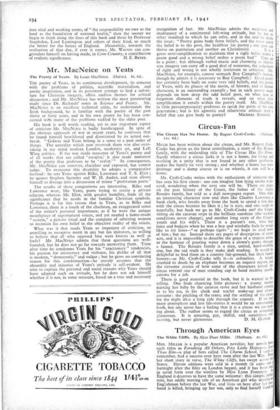Circus-Fan
The Circus Has No Home. By Rupert Croft-Cooke. (Methuen. I2S. 6d.) MUCH has been written about the circus, and Mr. Rupert Croft- Cooke has given us the latest contribution, a story of the Rosaire family, with the misleading title of The Circus Has No Home. Surely whatever a circus lacks it is not a home, for living and working in a unity that is not found in any other profession makes the family tie very strong ; and whether a home has main drainage and a damp course or is on wheels, it can still be a home.
Mr. Croft-Cooke writes with theenthusiasm of someone who has seen his first circus : one can imagine him lying awake w:de- eyed, wondering when the next one will be. There are pages on the past history of the Count, the father of the simple Rosaire family, but told as a dull newspaper report. One finds an interesting character now and then like Charles Lawrence, a bank clerk, who breaks away from the bank to spend a few days with the circus because he likes it ; he is nice, and one reads on hopefully, but back we go to Mr. Croft-Cooke and the Count, sitting on the caravan steps in the brilliant sunshine (the weather conditions never change), and another long story of the Count's youth and his wife's. There is a parson's son, who kept mice and badgers when he was a boy and wistfully feels he would like to try lions—" or perhaps tigers " ; we hope to read more of him ; but no. Instead there are pages of description of circus acts, and it is impossible to describe the grace of a trapeze artiste or the humour of pouring water down a clown's pants through a funnel. The Rosaire family is a nice, united, hard-working one, but the sad truth is they make dull reading. It would be delightful to find them on a country fair-ground, but their family history—as Mr. Croft-Cooke tells it—is colourless. A keeper crushed to death by an elephant becomes an inquest report, and the tiresome stories of how some of the characters joined the circus remind one of men standing cap in hand reciting qua• cations for a job.
There is good material in the book, but it is wasted in the telling. One finds charming little pictures : a young mother nursing her baby by the caravan stove and her husband coming in to his tea, in his chalk and scarlet make-up and clown• costume: the pitching of the tents; and the settling of the circus for the night after a long ride through the country. If we had more atmosphere and less life-stories it would be an entertaining book, but one never has a feeling that it is a circus we are read- ing about. The euthor seems to regard the circus as something glamorous. It is amusing, gay, skilful, and sometimes gerY


























 Previous page
Previous page